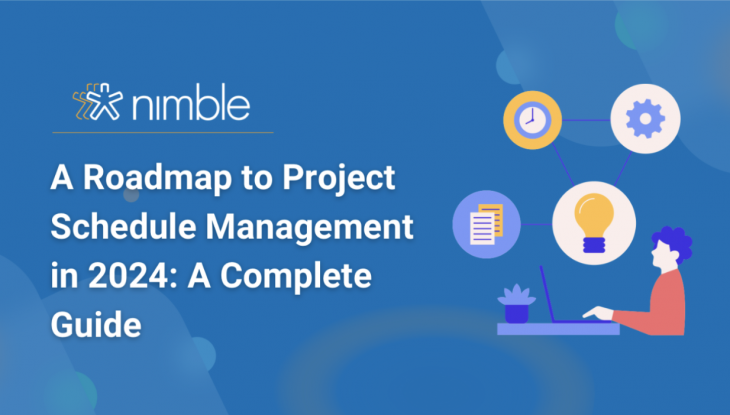Navigating the realm of project management excellence demands staying at the forefront of strategic evolution. In the ever-shifting landscape of 2024, mastering Project Schedule Management is paramount for success. This comprehensive guide serves as a strategic resource, shedding light on the latest tools, refined techniques, and prevailing trends crucial for ensuring a sophisticated and efficient approach to timeline management.
In the world of professional project management, being a master at Project Schedule Management is crucial. As we move into the challenges and opportunities of 2024, think of this guide as your all-in-one resource. It gives you the lowdown on the newest tools, straightforward techniques, and the current trends you need to know. These insights are vital for smart and efficient handling of project timelines.
What is Project Schedule Management?
Project Schedule Management is the strategy of planning, controlling, and executing project activities within a defined timeline. At its core, it answers the fundamental question of when each task will be completed, ensuring projects stay on track and within their designated timeframe. This empowers project managers to find potential obstacles, gather resources efficiently, and maintain a clear roadmap for successful project delivery.
In essence, project schedule management serves as the compass that guides project teams through the intricacies of timely task completion, a critical aspect of effective project management.
Essentials of Project Scheduling
Creating a Project schedule plan involves a series of essential steps integral to the effective planning and execution of a project’s timeline. These processes initiate with defining the project’s scope, objectives, and constraints.
Subsequently, meticulous planning unfolds, incorporating identified tasks, resource availability, and task dependencies. The development phase transforms these plans into actionable schedules, assigning tasks, estimating durations, and outlining dependencies.
Finally, the closing phase ensures that all project activities align with the original plan, concluding the project with a comprehensive review. These processes collectively form the backbone of the project schedule plan, guiding project teams from start to completion.
Simplified Methods for Effective Project Timelines
Project Schedule Management methods are the strategic approaches used to effectively plan, execute, and control project timelines. These methods guide project managers in tailoring their approach based on the unique characteristics of each project.
Common methods include the Critical Path Method (CPM), which identifies critical tasks, the Program Evaluation and Review Technique (PERT), which utilizes statistical analysis for task duration estimation, Agile methodologies that promote flexibility through iterative development, and the traditional Waterfall method, following a structured and sequential process.
Mastering the Foundations: Essential Elements of Project Schedule Management in 2024
Creating a project schedule management process involves a step-by-step process to ensure a well-organized and efficient project timeline. Start by outlining the project scope, objectives, and constraints, setting the groundwork for subsequent planning. Develop a detailed roadmap by identifying tasks, considering resource availability, and understanding task dependencies. Once the plan is in place, transform it into actionable schedules by assigning tasks, estimating durations, and recognizing dependencies.
Regularly monitor and control the progress, identifying any deviations and implementing necessary adjustments. Conclude the project by ensuring all activities align with the initial plan, accompanied by a comprehensive review. This structured approach ensures a comprehensive project schedule management process, fostering success from initiation to completion.
Project Success: Tools and Tips for 2024
In 2024, ensuring success in the project schedule process is achievable with the right tools and practical tips. Embrace project management software like Asana or Trello for seamless task tracking and team collaboration. Utilize communication tools such as Slack or Microsoft Teams to maintain open and efficient dialogue within the team.
Implement automation tools like Monday.com or Jira for streamlined progress tracking. Additionally, prioritize flexibility by employing tools like Gantt charts or Microsoft Project to adapt to evolving project dynamics. These specific tools, coupled with effective communication and adaptability, form the core of a successful project schedule management template in the dynamic landscape of 2024.
Delve into the realm of project scheduling mastery with this curated list of diverse learning resources. From online platforms to books and YouTube channels, these carefully selected outlets offer valuable insights and tools to enhance your skills, catering to both beginners and seasoned professionals in the field of project management.
Learning Platforms:
- Project Management Principles and Practices from the University of California, Irvine.
- LinkedIn Learning: Explore project management courses on scheduling.
YouTube Channels:
- ProjectManager.com: Practical tips and tutorials on project management, with a focus on scheduling techniques.
- Project Management Institute (PMI): Videos on project management topics, including schedule management and industry standards like PMBOK.
Books:
- “Project Management Absolute Beginner’s Guide” by Greg Horine:
- Comprehensive guide for beginners covering all aspects of project management, including scheduling.
- “Making Things Happen: Mastering Project Management” by Scott Berkun:
- Practical advice and real-world examples, including schedule management.
Easy Scheduling: Streamlined Templates
Project schedule management templates provide a structured foundation for efficient planning and execution. These pre-designed frameworks, often available in tools like Excel or project management software, save time and ensure consistency.
Utilizing templates helps in outlining tasks, defining timelines, and assigning responsibilities. Whether it’s a Gantt chart or a simple task list, templates serve as a starting point, fostering a standardized and organized approach to project scheduling. In 2024, leveraging these templates streamlines the process, enabling teams to focus on execution rather than starting from scratch, ensuring projects stay on course.
Project schedule management templates, available in tools like Microsoft Excel or project management software, offer a structured foundation for efficient planning and execution. Microsoft Excel provides a range of templates, from task lists to Gantt charts, easily customizable for different project needs. Websites like Vertex42 and Smartsheet offer downloadable templates compatible with Excel.
Dedicated project management software such as Asana and Trello provides built-in templates, catering to specific workflows. For more complex projects, tools like Microsoft Project offer advanced templates with detailed features for large-scale project management.
Utilizing these templates streamlines task outlining, timeline definition, and responsibility assignment, fostering a standardized and organized approach to project scheduling. In 2024, leveraging these templates ensures projects stay on course and are completed efficiently, allowing teams to focus on execution rather than starting from scratch.
Real Success: Project Schedule Examples
Examining project schedule management examples provides valuable insights into successful implementation strategies. For instance, in construction projects, creating a timeline that aligns with sequential tasks such as site preparation, foundation laying, and construction phases is crucial.
Similarly, in software development, employing Agile methodologies showcases flexibility with iterative planning and constant reassessment. Highlighting the adaptability of project schedule management examples across diverse industries, emphasize the importance of tailoring strategies to specific project needs. By learning from real-world examples, project managers can refine their approach, fostering successful project delivery in 2024 and beyond.
Managing a project successfully involves careful planning, resource allocation, and effective communication, as demonstrated in the following example guidelines:
- Define Clear Objectives and Deliverables:
- Establish measurable goals for the project.
- Break down the project into manageable deliverables.
- Develop a Detailed Project Plan and Set Realistic Deadlines:
- Create a comprehensive plan outlining tasks and dependencies.
- Use tools like Gantt charts for a clear visual timeline.
- Ensure achievable deadlines, factoring in potential delays.
- Accurate Time Estimation and Resource Allocation:
- Base time estimates on historical data and expert judgment.
- Allocate resources effectively, considering team skills and availability.
- Regular Monitoring and Updating of Schedule:
- Conduct frequent progress reviews against the schedule.
- Adjust the schedule to reflect actual progress and changes.
- Effective Communication and Stakeholder Engagement:
- Maintain transparent communication with stakeholders.
- Encourage feedback and adjust the schedule based on constructive input.
Looking Ahead: What’s Next for Project Schedule Management
Looking ahead to the future of Project Schedule Management, the landscape is evolving with emerging trends and innovations. In 2024, the focus shifts toward integrating artificial intelligence and machine learning into scheduling processes, offering predictive analytics for more accurate forecasting. Additionally, there’s a growing emphasis on collaborative and cloud-based tools, enabling real-time communication and access to project schedules from anywhere.
As the digital era progresses, the role of automation is set to expand, streamlining repetitive tasks and allowing project managers to concentrate on strategic decision-making. Keeping pace with these advancements will be key for project managers aiming to stay at the forefront of efficient and effective Project Schedule Management.
Nimble: Project Schedule Management with a Personal Touch
Meet Nimble — the optimal Project Schedule Management (PSM) tool tailored for discerning project managers who prioritize fostering relationships alongside meticulous schedule tracking. Nimble stands out as a comprehensive solution, offering an intuitive platform for managing project timelines, tasks, and team collaborations.
With a unique focus on both efficient schedule management and relationship cultivation, Nimble empowers project managers to seamlessly balance the intricacies of project timelines with the interpersonal dynamics crucial for project success. Nimble is not just a PSM tool; it’s a strategic ally for project managers dedicated to harmonizing effective schedule tracking with relationship-building prowess.
Sealing Success: Mastering Project Schedules in 2024 and Beyond
Embark on a journey into the dynamic landscape of Project Schedule Management in 2024. Explore the fundamentals, processes, and methods that define successful scheduling, accompanied by insights into the latest tools and tips. Uncover the power of templates, real-world examples, and the role of Nimble as the perfect CRM for project managers. As we look ahead, discover emerging trends shaping the future of project scheduling. This comprehensive guide equips project managers with the knowledge and tools needed to navigate the challenges and opportunities in the evolving world of project management.



